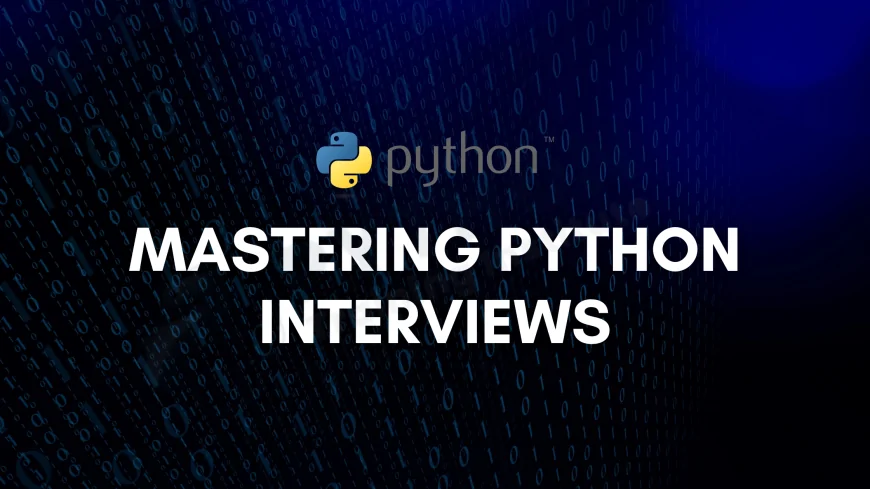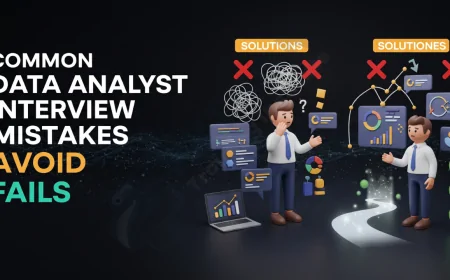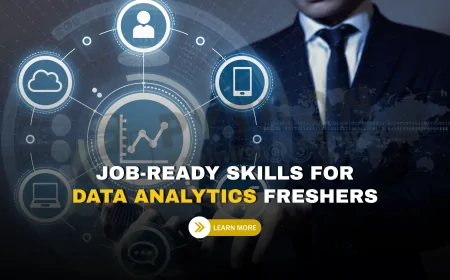How to Train for Python Coding Interviews | Expert Tips to Crack Your Next Tech Job
Want to crack your next Python coding interview? Discover expert strategies, must-learn topics, and hands-on techniques to master Python interview prep. Learn how Python Training Courses in Pune help boost your skills, confidence, and career opportunities with practical training and placement support.

Whether you're applying for a software development job, data science role, or automation engineer position, Python coding interviews are a crucial hurdle. Mastering Python is just the beginning — excelling in interviews requires a strategic and disciplined approach.
In this guide, we’ll walk through how to train for Python coding interviews step-by-step, without referencing specific universities or training institutes. From brushing up on core concepts to practicing real-world problems, this blog gives you a roadmap to succeed.
Why Python for Interviews?
Python is not just a popular programming language; it’s often the preferred language for technical interviews. It has a clean syntax, built-in data structures, and a vast ecosystem that supports everything from scripting to data science. Because of this versatility, many companies design interview questions assuming candidates will use Python.
Key Areas Assessed in Python Interviews
To ace Python interviews, you must master both Python syntax and problem-solving using Python. Below are the core areas interviewers commonly evaluate:
| Area | Description |
|---|---|
| Data Structures | Lists, dictionaries, sets, tuples, stacks, queues, linked lists |
| Algorithms | Searching, sorting, recursion, greedy, dynamic programming |
| System Design (optional) | High-level design concepts; usually for senior roles |
| OOP in Python | Classes, inheritance, polymorphism, encapsulation |
| Built-in Functions | Usage of map, filter, zip, enumerate, any, all, etc. |
| Libraries | Knowing standard libraries like collections, heapq, itertools, and math |
| Error Handling | Try/except blocks, understanding exceptions |
| Pythonic Code | Writing efficient, readable, and idiomatic code |
Step 1: Set Up Your Environment
Before diving into coding problems, ensure your environment is optimized:
-
Use a Code Editor: VSCode, PyCharm, or even Jupyter Notebook for practicing.
-
Install Python 3.10+: Stay up-to-date with features like pattern matching.
-
Setup Git: Helps track your projects and push code to platforms like GitHub.
-
Create a GitHub Repo: Use it to document your daily progress and build a public portfolio.
Step 2: Master Python Fundamentals
Even experienced developers get tripped up on the basics during interviews. Here's what to focus on:
Must-Know Python Topics
| Topic | Why It’s Important |
|---|---|
| Variables and Types | Python is dynamically typed — understanding behavior is key |
| Control Flow | Loops, conditions, and logical operations |
| Functions | Writing reusable and testable code |
| Comprehensions | Pythonic way to write loops and filters |
| Slicing | Essential for manipulating strings, lists, and tuples |
| String Manipulation | Common in parsing and formatting interview problems |
Step 3: Learn Data Structures and Algorithms in Python
Start with Native Data Structures
Understand how Python implements and uses data structures:
| Data Structure | Python Built-In | Interview Examples |
|---|---|---|
| Arrays | Lists | Rotate array, move zeros |
| Hash Tables | Dicts | Two sum, longest substring without repetition |
| Sets | Set() | Find duplicates, set intersections |
| Stacks/Queues | List/Deque | Balanced parentheses, sliding window max |
| Linked List | Custom Class | Reverse linked list, detect cycle |
| Heap/Priority | heapq |
K largest/smallest, merge k sorted lists |
| Graph | Dict + List | DFS, BFS, shortest path |
| Trees | Custom Node Class | Binary tree traversal, lowest common ancestor |
Algorithms to Focus On
| Algorithm Type | Common Patterns | Sample Problems |
|---|---|---|
| Sorting Algorithms | Merge sort, quicksort | Sort colors, find kth largest |
| Searching Algorithms | Binary search, linear search | Search in rotated array, search in 2D matrix |
| Recursion | Backtracking, divide and conquer | N-Queens, permutations, subsets |
| Dynamic Programming | Memoization, tabulation | Longest increasing subsequence, coin change |
| Greedy Algorithms | Choosing locally optimal options | Interval scheduling, jump game |
| Sliding Window | Optimized subarray problems | Longest substring with k distinct characters |
| Two Pointers | Fast/slow pointer problems | Palindromes, sorted array problems |
Step 4: Use the Right Practice Platforms
While you won’t use formal institute platforms, there are free or open alternatives to practice problems. Here’s a practice routine:
-
Start with easy problems: build confidence.
-
Move to medium problems: focus on time and space complexity.
-
Challenge yourself with hard problems: simulate real interviews.
Track your progress by category (e.g., Arrays, Hash Tables, Trees) and review why your initial solution failed.
Step 5: Simulate Real Interviews
Once you're solving problems consistently, simulate the actual interview experience:
-
Time-Bound Problems: Set a timer (30-45 mins) for each problem.
-
Use Whiteboard or Paper: For senior-level roles, practice without IDE help.
-
Think Out Loud: Verbalize your logic while solving problems.
-
Peer Review: Exchange mock interviews with a friend or community member.
Example Mock Interview Format:
-
5 min: Introductions
-
30 min: Solve one medium/hard problem
-
10 min: Optimize and discuss code
Step 6: Improve Python-Specific Fluency
Even if you're good at algorithms, fluency in Python-specific features gives you an edge:
Pythonic Techniques
-
Use unpacking:
-
Use list/dict/set comprehensions:
-
Use
zip,enumerate,any,all,map,filter,lambda.
Standard Library Gems
| Module | Use Case |
|---|---|
collections |
Counter, defaultdict, deque |
itertools |
Combinations, permutations |
heapq |
Priority queue |
bisect |
Binary search in sorted lists |
math |
Efficient mathematical functions |
Step 7: Build a Portfolio of Practice
Documentation matters. Treat your learning like a project:
-
Create a
Python-Interview-Preprepo. -
Organize by category (e.g., arrays, strings, graphs).
-
Write clear README files explaining each problem’s approach.
Benefits:
-
Reinforces your understanding.
-
Shows employers your consistency.
-
Lets you revisit solutions later for revision.
Step 8: Understand Behavioral and System Questions
While technical questions dominate, companies also ask:
Common Non-Coding Questions
-
Why do you want to work here?
-
Describe a time you solved a problem with Python.
-
Talk about a bug you couldn’t figure out and how you handled it.
System/Design Basics (For Mid-Senior Roles)
Understand these at a high level:
-
REST APIs
-
Databases (SQL vs NoSQL)
-
Scalability and performance
-
Architecture of a real Python project
Step 9: Study Frequently Asked Questions
While every interview is unique, certain questions recur across companies. Examples include:
| Problem Name | Topics Covered |
|---|---|
| Two Sum | Hashing, arrays |
| Merge Intervals | Sorting, greedy |
| Longest Substring w/o Repeat | Sliding window, hash tables |
| Valid Parentheses | Stack |
| Kth Largest Element | Heap, quickselect |
| Maximum Subarray | Dynamic programming |
| Word Ladder | Graph traversal (BFS) |
Study how multiple approaches apply to the same problem. Try writing brute force, then optimize.
Step 10: Track Your Progress Consistently
Use a simple table or spreadsheet:
| Date | Problem | Category | Difficulty | Notes |
|---|---|---|---|---|
| May 2 | Longest Palindrome | Strings | Medium | Used expand-around-center |
| May 3 | Two Sum | Hash Map | Easy | 1-pass solution using dict |
This helps track weaknesses and ensures even coverage.
Final Tips for Success
1. Think Before You Code
Read the question carefully. Don’t rush to write code — spend 5 minutes understanding edge cases, constraints, and examples.
2. Focus on Readability
Write code that’s easy to understand. Use descriptive variable names, comment only when necessary, and follow PEP8.
3. Know Your Complexity
Every solution should include a discussion of time and space complexity. Use Big O notation and understand how your code scales.
4. Handle Edge Cases
Common edge cases:
-
Empty inputs
-
Duplicates
-
Large inputs
-
Negative values
-
Sorted inputs
5. Learn from Others
Read other people’s solutions after solving a problem. You’ll often discover cleaner, faster, or more Pythonic ways to approach a task.
FAQ's
1. What is the best way to prepare for Python coding interviews?
Start by mastering core Python concepts like data types, OOP, and file handling. Then move to problem-solving using data structures and algorithms. Enrolling in a Python training course in Pune can offer structured learning, mock interviews, and placement support for better job preparation.
2. How long does it take to prepare for Python interviews?
With consistent effort, it usually takes 2–3 months to prepare well. A dedicated Python training course in Pune accelerates your learning with guided modules, hands-on projects, and mock interview sessions designed to suit job interview patterns.
3. Which Python topics are most important for interviews?
Key topics include loops, functions, classes, exception handling, recursion, and data structures like lists, sets, dictionaries, stacks, and queues. Python training programs in Pune cover all these topics in depth with interview-based examples and real-time problem-solving exercises.
4. Are Python coding interviews difficult to crack?
They can be challenging without practice. However, a good Python course from a reputed institute in Pune helps simplify tough concepts through hands-on training, real-life scenarios, and continuous assessments, making interviews easier to tackle.
5. How can a Python course in Pune help in interview prep?
Python courses in Pune offer well-structured modules, expert-led guidance, mock interviews, real-world projects, and personalized mentoring — all of which build confidence and technical skills to perform well in coding interviews and secure job placements.
6. Is DSA necessary for Python interviews?
Yes, data structures and algorithms (DSA) are crucial. Python interviews often test your logic and efficiency in problem-solving. Most Python training institutes in Pune include DSA as a core module, preparing you thoroughly for technical assessments.
7. Do Python institutes in Pune provide placement support?
Yes, many Python training institutes in Pune offer 100% placement assistance, resume building, mock interviews, and interview scheduling with IT companies, making your transition from training to employment smoother and faster.
8. How does hands-on Python training improve interview success?
Practical training helps you write clean, efficient code and boosts your confidence in live coding rounds. Institutes in Pune offer hands-on labs and projects that simulate real interview challenges, giving you a competitive edge.
9. What projects should I include in my Python portfolio for interviews?
Build projects like data analysis dashboards, web scraping tools, or automation scripts. Python training in Pune includes project work that aligns with industry trends, helping you showcase relevant skills in interviews.
10. Can beginners crack Python coding interviews with training?
Absolutely! Even beginners can crack interviews with consistent learning, structured guidance, and mock practice. Python institutes in Pune often have beginner-friendly modules designed to build your coding foundation from scratch.
11. How do mock interviews help with Python interview prep?
Mock interviews simulate real interview conditions, improve communication, and help identify weak areas. Python courses in Pune usually include mock interviews to help students understand technical questioning patterns and improve performance.
12. What kind of companies hire after Python interview training?
Tech startups, mid-sized IT firms, and large MNCs regularly hire Python developers. With proper training from institutes in Pune and hands-on experience, candidates can apply for roles in software development, automation, data analytics, and backend development.
13. Are Python certifications helpful for interviews?
Yes, certifications add credibility to your profile and validate your skills. Many Python training institutes in Pune provide industry-recognized certificates that make your resume stand out during job applications and interviews.
14. How do I improve my coding speed in Python for interviews?
Practice regularly with platforms like LeetCode or HackerRank and time yourself. Python courses in Pune often include coding marathons and speed-based challenges to enhance both accuracy and efficiency.
15. Do Python interviews include real-world problem-solving?
Yes, many interviews now include case-based or real-world scenarios. Training institutes in Pune integrate such challenges into their curriculum, ensuring you're not just learning syntax but also real-time application of concepts.
16. Should I learn libraries like NumPy or Pandas for Python interviews?
For data science roles, yes. For general software roles, focus first on core Python and DSA. Training in Pune allows you to explore both core and advanced modules based on your career goal, offering flexibility in learning.
17. What soft skills are important for Python interviews?
Communication, problem articulation, time management, and logical reasoning are key. Python training institutes in Pune often include soft skills and personality development workshops alongside technical training.
18. Can I learn Python interview skills online or offline in Pune?
Yes, both modes are available. Many Python training institutes in Pune offer flexible options—online, offline, and hybrid—with live classes, interactive doubt-solving, and recorded sessions for self-paced learning.
19. How do I stay motivated during Python interview prep?
Set daily coding goals, track your progress, and engage in study groups or community meetups. Python training institutes in Pune also provide mentorship and peer support, making the learning journey more engaging and goal-driven.
20. What is the career growth after clearing Python interviews?
Once you land your first role, you can grow into positions like software engineer, automation developer, backend engineer, or data analyst. Python training from a Pune institute builds a strong foundation for continuous career progression in tech.
Final Thoughts on Learning Python
Training for Python coding interviews is both a technical challenge and a mental game. By following a structured, self-paced plan that focuses on fundamentals, problem-solving, and real-world fluency, you position yourself far ahead of average candidates.
Remember: consistency beats intensity. Practice daily, track your growth, and continuously push the boundaries of your comfort zone.
You don’t need a brand name or formal certification to shine — just commitment, curiosity, and a solid training strategy.
What's Your Reaction?
 Like
0
Like
0
 Dislike
0
Dislike
0
 Love
0
Love
0
 Funny
0
Funny
0
 Angry
0
Angry
0
 Sad
0
Sad
0
 Wow
0
Wow
0













